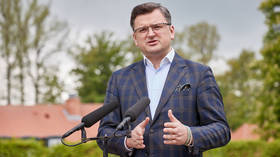Former Munich Security Conference chair suggests way to resolve Ukrainian conflict
Wolfgang Ischinger proposed that work to thrash out a peace initiative could be done through a contact group
Wolfgang Ischinger, the former chairman of the Munich Security Conference, has argued that an international contact group should be set up with a view to resolving the Ukraine crisis, with the US, the UK, France and Germany making up its core. Now is the time to start a serious conversation about ways to secure peace, he wrote in an op-ed for Germany’s Der Tagesspiegel newspaper on Sunday.
Ischinger, who presided over the annual security convention from 2008 until 2022, opined that “it is high time that we put in motion a peace process for Ukraine.” He acknowledged that critical voices in the West are posing questions that are not “completely unjustified,” such as how much longer governments are planning to pump the Eastern European country with weapons.
With this in mind, the veteran German diplomat called for the “immediate” creation of a special contact group that would function alongside the existing Ramstein Air Base group, which helps coordinate defense aid to Ukraine.
Such a congregation of world powers, according to Ischinger, should be given a mandate to thrash out multiple settlement scenarios and options, as well as to prepare draft agreements so that, if and when Kiev and Moscow decide to sit down at the negotiating table, there is already some groundwork in place for a peace process.
In addition to the four mentioned Western powers, the contact group envisaged by the German politician would also involve nations like Canada, Spain, Poland, Italy, the Baltic states, as well as the UN, EU, OSCE and NATO. To make it more representative, invitations should also be extended to the likes of Brazil, India and China, Ischinger added.
He said the key issues on the group’s agenda would include the terms of a ceasefire, the issues of sovereignty over Crimea and parts of Donbass, security guarantees for Ukraine, and its possible NATO membership.
Officials in Moscow have on several occasions made it clear that they are open to negotiations with Kiev in principle, provided that Ukraine accepts Russia’s conditions and recognizes what the Kremlin calls the “reality on the ground.”
Addressing Russia’s Federal Assembly late last month, President Vladimir Putin claimed that it was Ukraine and its Western backers who had “started the war.” Moscow, according to Putin, “has been using force to stop them.”
In January, Russian Foreign Minister Sergey Lavrov signaled that Moscow was “ready to respond to all serious proposals” to resolve the conflict. He claimed, however, that the West does not allow Kiev to make decisions on its own.






Comments are closed.